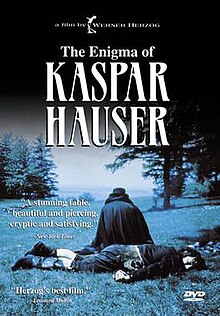The Enigma of Kaspar Hauser
| The Enigma of Kaspar Hauser | |
|---|---|

DVD cover
|
|
| Directed by | Werner Herzog |
| Produced by | Werner Herzog |
| Written by | Werner Herzog |
| Starring | |
| Music by | Florian Fricke |
| Cinematography | Jörg Schmidt-Reitwein |
| Edited by | Beate Mainka-Jellinghaus |
|
Production
companies |
|
| Distributed by | Werner Herzog Filmproduktion |
|
Release date
|
|
|
Running time
|
109 minutes |
| Country | West Germany |
| Language |
|
The Enigma of Kaspar Hauser (German: Jeder für sich und Gott gegen alle; lit. Every Man for Himself and God Against All) is a 1974 West German drama film written and directed by Werner Herzog and starring Bruno Schleinstein (credited as Bruno S.) and Walter Ladengast. The film follows the real story of foundling Kaspar Hauser quite closely, using the text of actual letters found with Hauser.
The film follows Kaspar Hauser, who lived the first seventeen years of his life chained in a tiny cellar with only a toy horse to occupy his time, devoid of all human contact except for a man, wearing a black overcoat and top hat, who feeds him.
One day, in 1828, the same man takes Hauser out of his cell, teaches him a few phrases, and how to walk, before leaving him in the town of Nuremberg. Hauser becomes the subject of much curiosity, and is exhibited in a circus before being rescued by Professor Georg Friedrich Daumer, who patiently attempts to transform him.
Hauser soon learns to read and write, and develops unorthodox approaches to logic and religion; but music is what pleases him most. He attracts the attention of academics, clergy and nobility, but is then physically attacked by the same unknown man who brought him to Nuremberg. The attack leaves him unconscious with a bleeding head. He recovers, but is again mysteriously attacked; this time, stabbed in the chest.
Hauser rests in bed describing visions he has had of nomadic Berbers in the Sahara Desert, and then dies. An autopsy reveals an enlarged liver and cerebellum.
The casting and character names are based on the submission to the Academy of Motion Picture Arts & Sciences.
Herzog has been quoted as saying that the title (German: Jeder für sich und Gott gegen alle) for the film was inspired by a sentence in the novel Macunaíma by Brazilian writer Mário de Andrade.
...
Wikipedia
